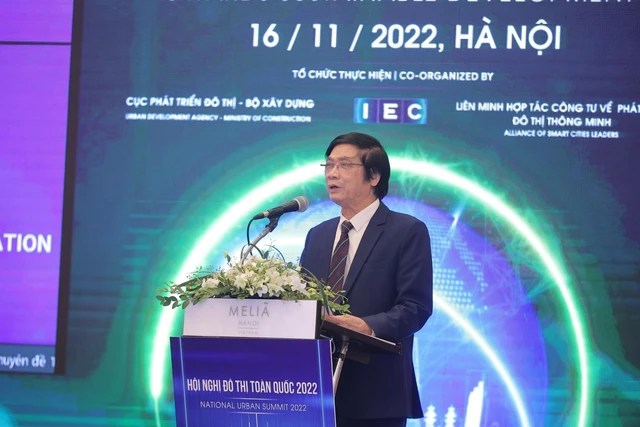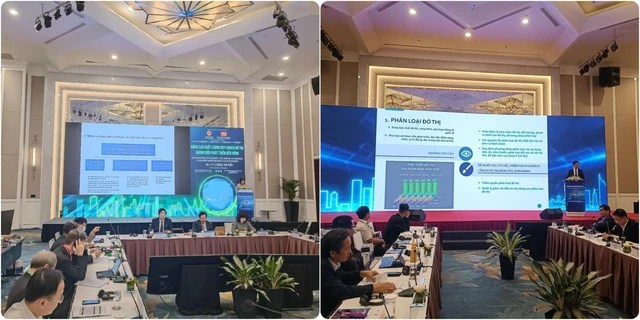Property tax is low and there is a big difference between Vietnam and many countries in the region and around the world. According to experts, this leads to many bad consequences. And a connection is that urban development in Vietnam still has many unsustainable factors.
The above points were analyzed and evaluated by experts at the National Urban Conference in 2022, organized by the Ministry of Construction in collaboration with the Central Economic Commission on the afternoon of November 16.
The conference had 3 seminars on: “Improving the quality of urban planning towards sustainable development”; “Development of infrastructure systems and urban reconstruction” and “Mechanisms and policies for urban development management” in order to implement the Government’s Action Program to implement Resolution 06-NQ/TW and enjoy Vietnam Urban Day.
According to the Ministry of Construction, 2022 marks many important events related to urbanization and urban development in Vietnam.
Accordingly, on January 24, 2022, the Politburo issued Resolution 06-NQ/TW for the first time on the planning, construction, management and sustainable development of urban areas in Vietnam until 2030, with a vision to 2045 (Resolution 06-NQ/TW), identifying cross-cutting guiding views, specific goals and tasks, and solutions to enhance urban planning, construction, management and development.
Recently, on 11/11/2022, the Government issued Resolution No. 148/NQ-CP with practical action groups concretizing Resolution 06-NQ/TW.
Also in 2022, the 11th World Urban Forum was successfully held in Katowice, Poland with the theme “Transforming Cities for a Better Urban Future”.
In Vietnam, by September 2022, the whole country has 888 urban centers, accounting for about 41.5% of the population, urban areas have been and are important development engines of regions and the whole country. Especially, after the strong impacts of natural disasters and epidemics recently, urban areas are also central foundations, forming new opportunities, providing solutions to promote activities to restore the economy.
However, experts say that the development of urban areas still has many unsustainable factors. Urban infrastructure has not kept pace with urbanization. Urban renovation, embellishment and reconstruction has not been paid attention and there is no master plan for implementation. In which, resources are lacking and have not been socialized. In particular, financial resources to cope with natural disasters, epidemics and climate change are still very limited.
The development still has many unsustainable factors
At the event, the first session with the theme “Improving the quality of urban planning towards sustainable development” and the third session with the topic “Mechanisms and policies for urban development management” were collected attracted a lot of attention from the guests by the information related to Orientation planning urban system in Vietnam; major solutions for construction planning and management; as well as related mechanisms and policies for sustainable urban management and development.
At these thematic sessions, many experts shared the view that the planning and development of Vietnam’s urban system, despite some achievements, has not yet brought into full play the national potential; There are still many bottlenecks and limitations.
Therefore, towards sustainable urban development, it is very important to renew planning thinking so that the planning infrastructure can be one step ahead, creating a driving force for economic development.
Speaking at the event, the architect Tran Ngoc Chinh, Chairman of the Vietnam Urban Planning and Development Association, said that the development of urban areas today still has many unsustainable factors; in which, urban infrastructure has not kept pace with urbanization.
At the same time, the work of urban renovation, embellishment and reconstruction has not been paid attention, there is no master plan for implementation, resources are lacking and socialization has not been given. In addition, financial resources to cope with natural disasters, epidemics and climate change are very limited.
Tran Ngoc Chinh, Chairman of Vietnam Urban Planning and Development Association speaking at the event.
Mr. Tran Ngoc Chinh emphasized that the limitation is that regulations and standards are still slow to innovate and have not yet promoted the role of urban planning in economic development. In which, resources are an important factor in urban development, but the general planning and zoning planning have not been shown.
“Urban development, urban exploitation thinking only meets immediate needs, lacks long-term investment vision. The gap between rich and poor among urban residents is increasing, leading to inequality equality in access to and enjoyment of social welfare…”, Mr. Tran Ngoc Chinh said.
Chairman of the Vietnam Association of Urban Planning and Development said that the limitations and weaknesses that have been pointed out have many factors, but there are many subjective reasons. First of all, the awareness of urbanization and urban development in Vietnam is still unsustainable, and incomplete and has not been given due attention. In addition, urban planning is slow to innovate, lacks vision, low quality…
Agree, architect. Truong Van Quang, Deputy General Secretary of the Vietnam Association of Urban Planning and Development, said that currently many problems in construction planning are related to many branches and fields that cannot be resolved.
According to architect Quang, we still have little understanding of how the impact of the transition to a market economy will affect the quality of urbanization. In addition, the work of predictive thinking is still slow compared to the reality of the urbanization process and market rules.
Speakers present presentations at the National Urban Conference in 2022. Photo: Tuan Viet
There is a huge difference between Vietnam’s real estate tax collection compared to other countries
Presenting at the thematic session on “Mechanisms and policies for urban development management”, Prof. Dang Hung Vo, former Deputy Minister of Natural Resources and Environment mentioned the reform of the tax system with real estate in Vietnam.
According to Mr. Vo, compared with other countries, Vietnam’s tax on land and investment properties on land is still very backward, even compared to other countries in the Southeast Asian association. Property tax of Vietnam only accounts for 0.034% of GDP, while this tax of Indonesia accounted for 0.42%, of Thailand accounted for 0.25%, and of the Philippines accounted for 0.84%.
Compared with the countries of the Organization for Economic Cooperation and Development (OECD), the property tax of the G7 group of countries is from 1% to 4% of GDP, the group of countries in the former socialist bloc also reaches from 0 to 4%. .2% to 1%, the OECD average reached 1.856%. In all countries, including Vietnam, this tax is collected for the local budget. In the G7 countries, this tax contributes 90% of local budgets in the UK (highest country) and 40% in Germany (lowest country).
According to Mr. Dang Hung Vo’s calculations, the property tax in Vietnam is only about 7% of the group of medium developed countries of the ASEAN Association, only about 1.6% of the average level of the OECD group of countries, and only about 1% of that of the G7 countries.
Notably, according to Mr. Vo, the efficiency of a collection system, including low property taxes, will lead to 7 bad consequences.
Firstly, all people want to store their savings in real estate, unable to mobilize money from people to invest in production and business.
The second is very low land use efficiency; a lot of land is left fallow, uninhabited urban areas still called “ghost” cities appear in many places, and “hanging” projects that already have land but have not been implemented or implemented slowly have become commonplace.
The third is the fact that the migration of people to cities is quite strong, and infrastructure investment has not kept up with the reality of population growth, causing a rapid decline in the quality of urban life.
Fourth, there is not enough state funding to develop urban infrastructure and public services in urban areas because there is no regular revenue source for this purpose.
Fifthly, the situation of land speculation increases, causing real estate prices to rise, both making the economy less competitive and making it difficult to settle housing for low-income people.
The sixth is the unstable real estate market, when it heats up too quickly and when it freezes too quickly.
In fact, our country’s real estate market froze in the period of 2003 – 2006, had a strong price fever in the 2007 – 2008 period, then fell into a freeze again in the 2009 – 2013 period, recovered and developed in the next period. In 2014 – 2018, there was a deep decrease in supply from 2018, a feverish price since 2020 and standing still from 2022 due to almost no supply. Currently, many projects are suspended, and many projects are waiting for approval but cannot be approved.
The seventh is that the quality of urbanization is low, which does not meet the needs of the country’s development in time, especially in the period when we have to step up the quality of the urbanization process urban construction according to the philosophy of “green development” and “smart development”.
GS.Dang Hung Vo at the event. Photo: Tuan Viet
Former Deputy Minister of Natural Resources and Environment said that there is a big difference between the way Vietnam collects money from land compared to other countries. Specifically, the most significant revenue from land value in Vietnam comes from the mechanism of land acquisition by the State.
Mr. Vo acknowledged the fact that if compensation is adequate for people whose land is recovered by the State, this solution will not bring economic efficiency. Accordingly, Vietnam’s largest land value revenues are still in the nature of transferring land value from the private sector to the value of land belonging to the public sector. On the other hand, when the State recovers land, it also creates many potential risks of land corruption.
“This is also the main cause of current social instability problems, which is clearly shown in the situation that complaints about land still account for 70% of the total number of civil complaints” said Mr. Dang Hung Vo.
From the above reality, the former Deputy Minister of Natural Resources and Environment also offered suggestions for the “land contribution/re-adjustment” mechanism, which has been successfully applied by countries in urban embellishment and development, especially in major economies such as Japan, Korea, and Taiwan.
This is understood as a solution to implement urbanization with local land resources. With this mechanism, the State will not lose funds for urban development, contributed enough land to develop infrastructure and public services, upgrade urban areas and have the remainder to sell to have money for construction.
At the same time, local people also enjoy benefits because they live in a more spacious residential area. Urban areas are developed, better embellished, in accordance with the planning. According to Mr. Vo, this mechanism will “no place for the interests of project investors”.
Source: CafeF
Source: Vietnam Insider



